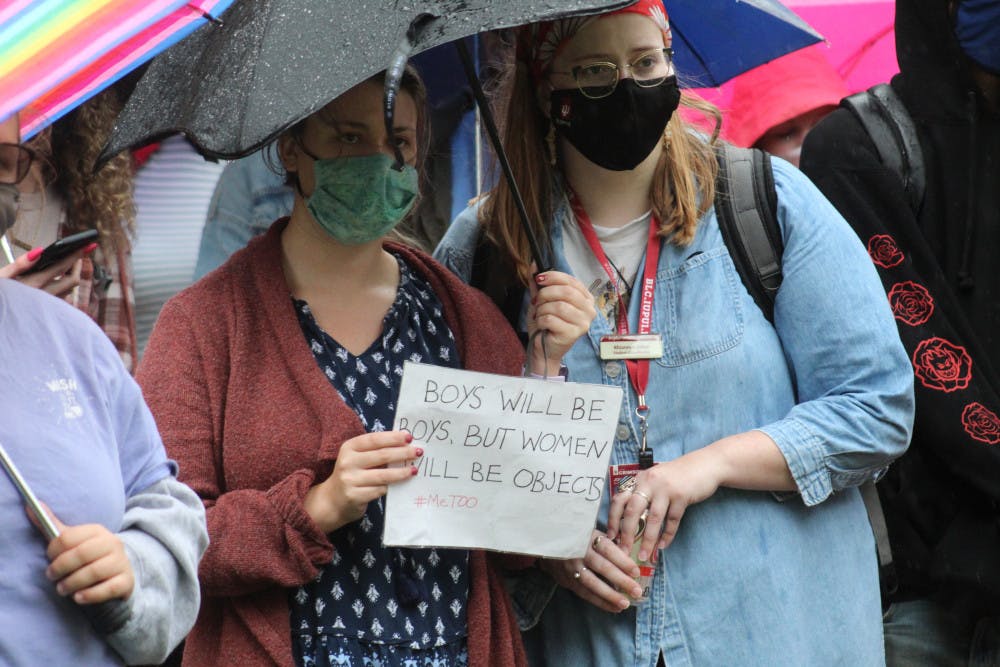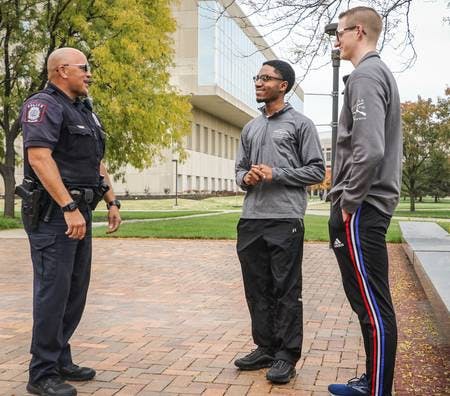While attending college, students live, work and participate in recreational activities on campus. A major concern for many of them is simply staying safe.
A number of on-campus organizations have recognized this and are working towards creating such an environment.
Major Heather Braun is the Director of Accreditation and Strategy of the Indiana University Police Department. In her previous role as lieutenant of the IUPUI branch of the IUPD, she specialized in the Clery Act, which is a federal law that is designed to protect students.
“The Clery Act provides a framework of policies and processes designed to keep the campus community safe,” Braun said.
According to the Clery Center, The Clery Act “requires colleges and universities to report campus crime data, support victims of violence, and publicly outline the policies and procedures they have put into place to improve campus safety.”

The Clery Act is named after Jeanne Clery, a 19 year old college student from Lehigh University, who was raped and murdered in her dorm room in 1986. The Clery Act was passed in 1990 and includes four categories of crime statistics: Criminal Offenses, Hate Crimes, Violence Against Women Act (VAWA) Offenses, and Arrests and Referrals for Disciplinary Action.
There have been six amendments to the Clery Act since it was passed, the most recent one being in 2013 with the reauthorization of VAWA. VAWA protections now apply to everyone regardless of sex identification.
“It basically doubled the requirements of the annual security report,” Braun said. “It added additional crime categories that we’re required to report on in our annual security report, and a whole host of other policies and processes that work in tandem with Title IX regulations.”
According to the U.S. Department of education, Title IX states “No person in the United States shall, on the basis of sex, be excluded from participation in, be denied the benefits of, or be subjected to discrimination under any education program or activity receiving Federal financial assistance.”
Braun also expressed that there may be other changes made to the Clery Act in the near future, including the addition of regulations on hazing and mental health topics, such as suicide prevention.
These crime categories are filed into both a daily crime log and an Annual Security Report (ASR), which are available to the public. Along with the crime logs, emergency alerts and crime notices are released to students through email, and other forms such as text message.

Students with protest signs | Photo Courtesy of Ashley Wilson
“The Clery Act requires several ongoing disclosures,” Braun said. “Part of that is emergency alerts. That’s for something that is occurring right now, where we need the campus community to do something right now, where there’s an imminent threat to the health or safety of the campus community.”
Emergency alerts can be noncriminal, such as weather warnings, or they can be criminal alerts, such as a shooter on or near campus. Crime notices, on the other hand, are issued after IUPD has done a risk assessment.
“The whole point of crime notices is to aid in the prevention of similar crimes,” Braun said. “Whatever has been reported, the facts and circumstances of that particular incident, we’ve determined that there’s a risk for future perpetration of that crime and we issue a crime notice for those.”
Although IUPUI is located very close to downtown Indianapolis, Braun does not feel as if this has a major impact on campus safety.
“We have a lot of traffic that comes through campus,” Braun said. “Especially with our local hospitals basically right on campus, we do get a lot more visitors than a traditional campus that’s not in an urban area. But I wouldn’t say that we are less safe because of that.”
Braun recommended many safety resources available to students on campus, including the Rave Guardian app. Some features of the app include resources for safety, contact information and a safe-walk timer.

Braun also recommended safety features provided by IUPD, such as the emergency call boxes on campus and the courtesy police escort service. The call boxes are equipped with cameras, which allow officers to assess the situation.
Along with these resources from IUPD, Braun believes that all students should look into both the ASR and the daily crime log, which includes crimes reported in the past 60 days.
“I think that safety is everybody’s responsibility,” Braun said. “And the more informed that the community is about what’s going on, and the more awareness that we have about it, the safer we’re going to be.”
Along with IUPD, students on campus are advocating for their safety and awareness of the challenges that they face. One of these students is Anna Morgan, who is majoring in Civic Leadership and is currently the marketing director for It's On Us. She previously served as secretary.
“It’s On Us is a nationwide organization that helps students on campus organize to help combat campus sexual assault,” Morgan said. “We do this through spreading awareness, and also through giving out tools and resources for educating the student population, so we can all work together to combat this issue.”
Morgan explained that there is always room for improvement, especially when it comes to the safety of students on campus.
“I feel like IUPUI is as a whole a safe campus, but there’s a lot that still needs to be improved upon,” Morgan said. “What needs to be improved upon is the education aspect and normalizing conversations about sexual assault and sexual assault awareness. The problem is we’re not having these conversations.”
Morgan emphasized that it is important to hold people accountable when teaching about sexual assault and other safety issues.
“A lot of universities have a course where it’s required for incoming students to take a class that teaches you about consent,” Morgan said. “We have an online course but it’s ineffective and needs improvement.”

Morgan also suggested IUPUI include consent education in First Year Success Seminar courses.
“There are plenty of resources and outlines that the school has available,” Morgan said. “The Sexual Assault Prevention, Intervention and Response Task Force (SAPIR) has so many resources available that can be utilized during First Year Success Seminar.”
Another resource that Morgan discussed was Counseling and Psychological Services (CAPS) at IUPUI.
As a college student who has dealt with safety issues on campus, Morgan uses her own experiences as motivation to create a safer environment for students.
“I’m fighting for community outreach, for people to come together and more inclusivity on campus, so that people have a place to belong and feel safe,” Morgan said.
Ashley Wilson is a sophomore double majoring in creative writing and journalism at IUPUI. She is a reporter focusing on campus and culture as well as a photographer for The Campus Citizen.





